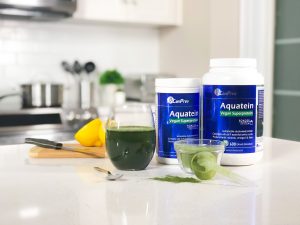When you hear the word protein, what’s the first thing that comes to your mind? We often think of meat, poultry, fish, eggs and dairy, forgetting there are plant-based foods that are also rich in protein, among other nutrients. If you are looking to explore a plant-based diet, here’s everything you need to know about protein, including recommended daily intake, benefits, food sources and supplement options.
The Basis of Protein: What Is It and Why We Need It
Protein is an essential nutrient necessary to build, maintain and repair tissues. Our bodies use protein to make enzymes and hormones that keep us functioning healthy. Mainly found in muscle, bone, skin, hair, as well as other body parts, protein is composed of amino acids, a group of organic compounds. There are 21 amino acids that have a functional role in the body, helping you live, grow and recover.
While our bodies can produce 12 amino acids from scratch, 9 of them must come from food. These include: histidine, isoleucine, leucine, lysine, methionine, phenylalanine, threonine, tryptophan, and valine. They are known as the essential amino acids.
Recommended Protein Intake
We are able to meet the need for essential amino acids through food sources rich in protein and by keeping total daily calories at the individual’s required amount. The recommended protein intake is 0.8 grams for every kilogram of body weight. While the goal can be met by consuming meat, plant-based proteins are also able to offer other health benefits. Legumes like beans and peas, nuts, seeds, and whole grains are healthy not only for your body but for the planet too.
Benefits of Plant-Based Proteins
A notable benefit of plant-based proteins is preventing the risk of heart disease and type 2 diabetes. Studies have shown that balanced plant-based diets can be a solid foundation for one’s weight loss journey. Vegetables, fruits, grains and beans provide your organism with proteins and also contain vitamins, minerals, and antioxidants necessary for proper body functioning.
Plant-based proteins, however, tend to be more difficult to digest and contain lower essential amino acid content. It’s crucial, therefore, to choose a healthy variety of foods to ensure proper protein intake. The good news is, plants are easy to mix and match.
Food Sources for Protein
Here is a plant-based protein source chart that lists options for foods naturally rich in protein.
| Category | Food Sources |
| Legumes | Lentils, beans, peas, soybeans, peanuts |
| Nuts & Seeds | Almonds, pistachios, cashews, walnuts, hazelnuts, pumpkin seeds, sunflower seeds, sesame seeds, chai seeds |
| Whole Grains | Kamut, teff, wheat, quinoa, rice, oats, buckwheat |
Whey vs Plant-Based Protein
Protein powders have become a popular option to filling nutrient gaps and ensuring sufficient intake. A common option is a whey-based protein powder, which is derived from goat or cow’s milk.
Whey is a complete protein often used for increasing athletic performance, muscle growth, and strength. If used correctly, whey protein may also help with weight loss and support muscle recovery.
However, allergies and food sensitivities are becoming more common. Studies have shown that lactose intolerance is more frequent than we think and often causes digestive issues. Since whey is derived from milk, this is a primary concern for those with sensitive GI, making plant-based protein a suitable alternative. Some individuals also find plant-based protein powders are easier to digest and reduce bloating.
A Complete Source of Plant-Based Protein
CanPrev’s Aquatein Vegan Superprotein offers a complete source of protein that’s entirely plant-based. Uniquely cultivated from duckweed, Aquatein contains all 9 essential amino acids, providing our body with the protein it needs, as well as being naturally rich in minerals, omega-3s, fibre, and phytonutrients. Because it comes from just one plant source, Aquatein is hypoallergenic, highly-digestible, and vegan-friendly. Give your body refreshing nutrition while supporting a healthier planet!
Whether you choose animal or plant-based protein, or perhaps a combination of both, it is important to keep healthy levels of amino acids to support healthy functioning and reduce the risk of diseases. Do what is right for your body and unique health needs.
References
The Role of the Anabolic Properties of Plant- versus Animal-Based Protein Sources in Supporting Muscle Mass Maintenance: A Critical Review https://www.ncbi.nlm.nih.gov/pmc/articles/PMC6723444/
Healthful and Unhealthful Plant-Based Diets and the Risk of Coronary Heart Disease in U.S. Adults http://www.hivdent.org/_nutrition_/2017/411.full.pdf
Abstract 23081: Anti-inflammatory Effect of Whole-Food Plant-Based Vegan Diet vs the American Heart Association – Recommended Diet in Patients With Coronary Artery Disease: The Randomized EVADE CAD Trial https://www.ahajournals.org/doi/abs/10.1161/circ.136.suppl_1.23081








Leave A Comment